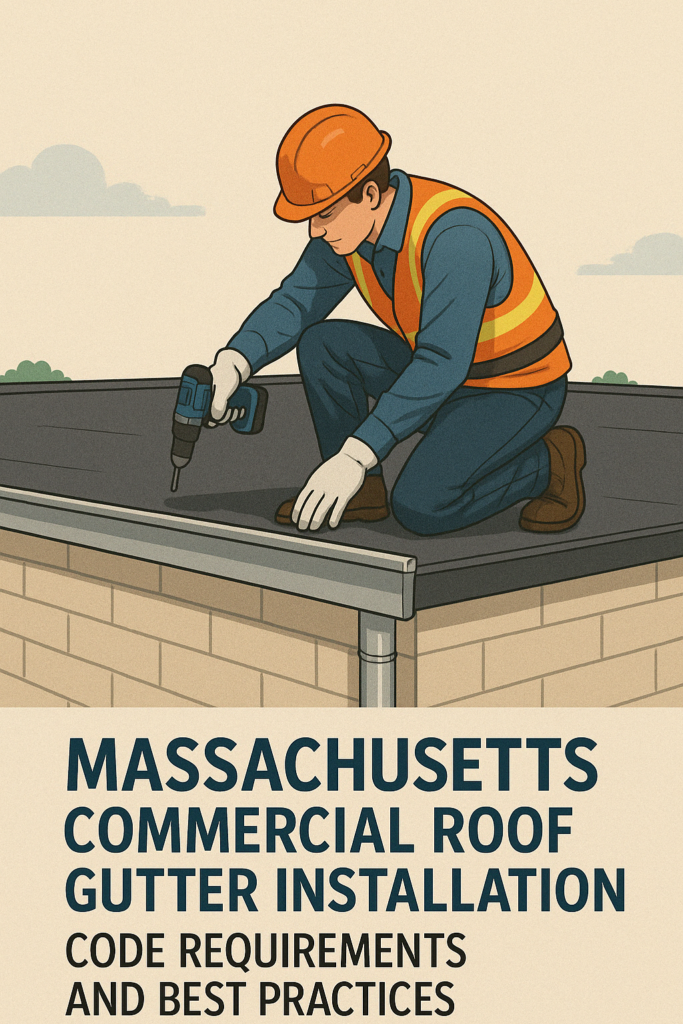Unlocking the Durability of PVC Roofing: Is a PVC Roofer Right for Your Project?
Reading Time: 9 minutesDetermining whether to hire a PVC roofer involves understanding their influence on your roof’s lifespan and strength. A professional PVC roofer’s expertise goes beyond basic installation, contributing to superior weatherability and energy efficiency. Read on to uncover the practical impact of a PVC roofer on your project.
The Essentials of PVC Roofing
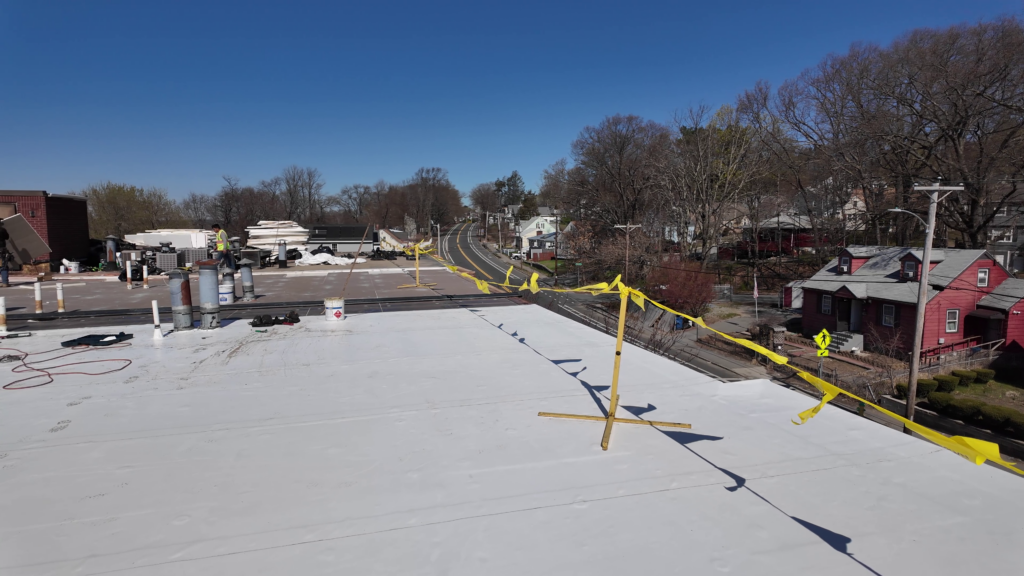
PVC roofing is highly regarded in the roofing industry for its:
- Durability and longevity
- Lifespan often exceeding 20 years
- Excellent weather ability
- Flame-retardant characteristics
- Suitability for low-slope roofs
PVC roofing membranes enhance these attributes by contributing to PVC roofing systems’ durability, energy efficiency, and superior weatherability.
Polyvinyl chloride (PVC) has become the go-to material for many roofing professionals and building owners.
There are several reasons why PVC roofing is attractive. Its durability, low maintenance, and energy efficiency make it a popular choice for many homeowners. What sets it apart from other roofing materials like TPO and EPDM? And what goes into the anatomy of a PVC roofing system? Let’s delve deeper.
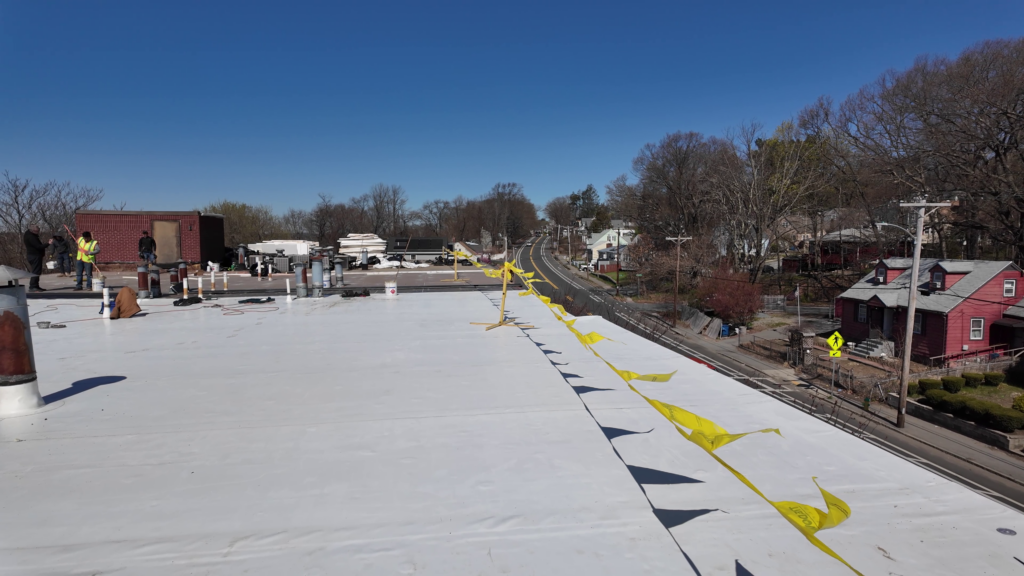
Ask PVC Roofer: What Makes PVC Stand Out?
The robustness and longevity of PVC roofing are vital attributes that distinguish it. It is highly durable, lightweight, and quick to install, showcasing excellent chemical and water resistance. But its benefits extend beyond just durability. PVC roofing is a friend to the environment as well. Some of its benefits include:
- Reflective properties that help reduce urban heat island effects and greenhouse gas emissions
- Recyclable nature that supports green design initiatives
- Sustainable choice for the conscious builder
Compared with other single-ply roofing systems like TPO, PVC stands out due to its superior chemical resistance and tear and break strength. It also has a longer lifespan, making it a cost-effective solution. What’s more, the innate flame and fire resistance of PVC roofing materials, coupled with added fire retardants in their composition, enhance the safety of the building by achieving high fire ratings. That said, it’s important to note that while PVC roofing offers numerous environmental benefits, it can also raise environmental concerns due to releasing dioxins and other harmful chemicals if burned.
The Anatomy of a PVC Roof System
Composed of two layers of PVC with a polyester reinforcement scrim in the middle, a PVC roofing membrane boasts the strength and durability that PVC roofs are famous for. If insulation is required for the roofing system, professional PVC roofers will properly lay and fasten insulation boards to the roof deck before installing the PVC membrane. This attention to detail ensures the structural integrity of the roof and its ability to withstand the elements.
Installing a PVC roofing system requires precision and care, which is why professionals should do it. One of the critical steps in the installation process is heat welding, a technique used to join PVC membrane seams. This technique, performed with expertise, ensures seam strength and integrity, leading to a reliable, watertight, and long-lasting roof.
Expertise in Installation: The PVC Roofer’s Role
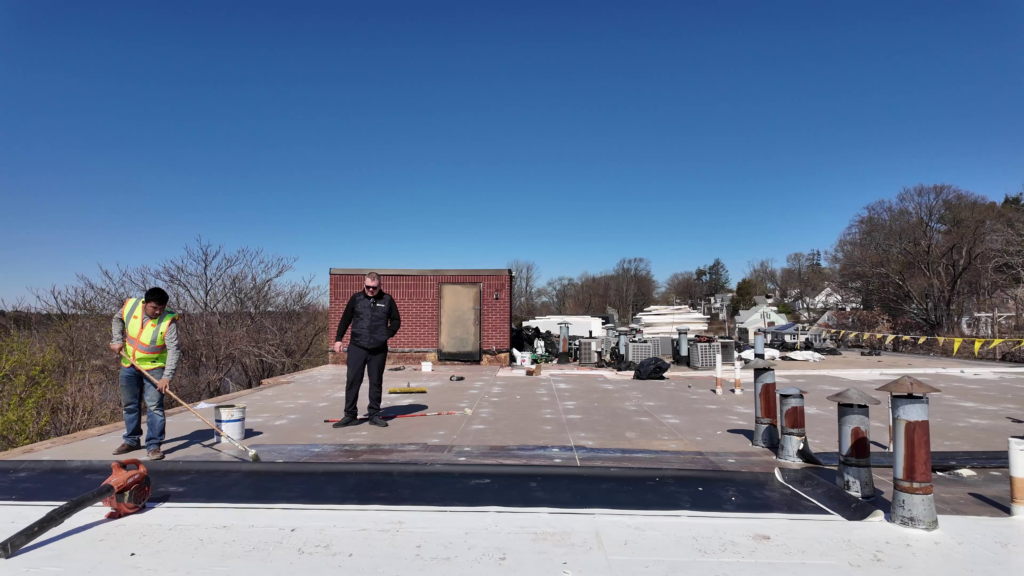
A roof’s durability and longevity depend not only on the quality of the roofing material but also on the roofer’s expertise. A skilled PVC roofer is essential for properly installing PVC roofing, which is critical for the roof’s performance and longevity.
Professional roofers not only bring their expertise in the installation process but also provide tailored warranties and maintenance programs to extend the life and condition of the PVC roof. This comprehensive approach to roofing installation ensures that your roof continues to provide protection and value long after the initial installation.
Ensuring Structural Integrity
A professional PVC roofer will thoroughly assess the existing roof’s condition before laying down the PVC membrane. This evaluation is crucial to ensure the roof’s structural integrity and to prepare it for the membrane’s installation.
Professional PVC roofers will thoroughly clean the roof deck as part of the pre-installation process. This step ensures the deck is dry, free from debris, and devoid of sharp objects that could damage the membrane. This meticulous attention to detail is a testament to the dedication of professional PVC roofers to ensure the longevity and performance of the roofing system.
Mastery of Heat Welding Techniques
The quality of a well-constructed PVC roof depends largely on its seams. Achieving permanent and reliable seams in PVC roofing is essential for the system’s durability and longevity, and it depends on the roofer’s proficiency in heat welding techniques.
Professional PVC roofers extensively use automatic hot air welders for fusion-welding seams, ensuring a dependable watertight seal. This technique results in a bond that offers increased durability and longevity over adhesive-based systems. From using handheld tools for less accessible areas to making specialized protocols and adjustments in welding speed for colder conditions, mastering heat welding techniques is an indispensable part of a professional PVC roofer’s skill set.
The Benefits of Hiring a Professional PVC Roofer
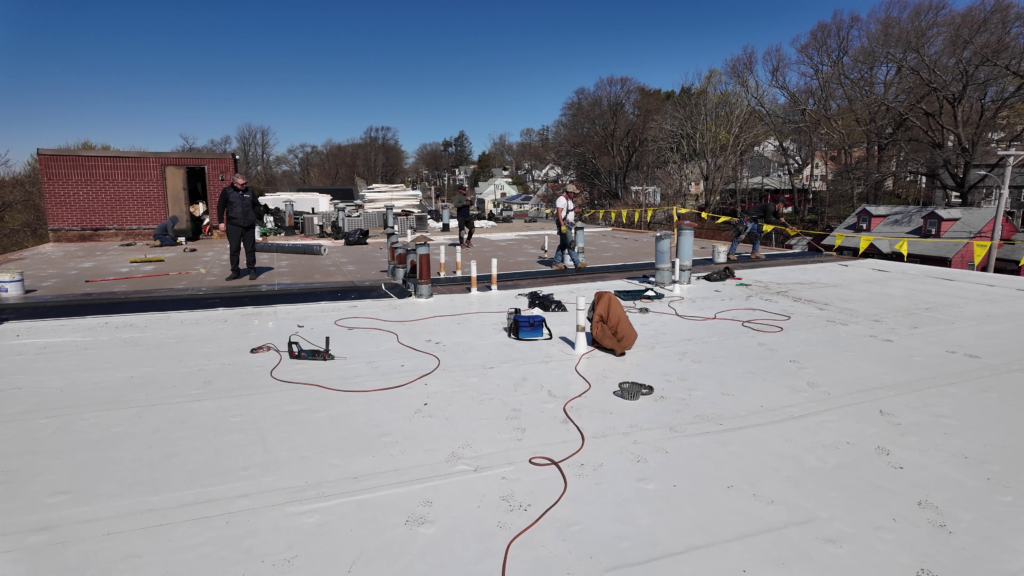
Despite the many benefits of PVC roofing, the significance of employing a professional PVC roofer is undeniable. Skilled PVC roofers utilize specific installation tools and techniques that contribute to the proper and durable installation of PVC roofing systems.
Their expertise in applying the latest installation techniques and using high-quality materials ensure the roof’s durability and attractive appearance. Prefabrication of flashing details and deck sheet customization in factory settings are practices employed by professional PVC roofers to enhance installation quality, adding another layer of assurance to the property owner.
PVC Roofer – Quality Assurance
Professional PVC roofers’ expertise is essential to:
- Install a roofing system capable of withstanding extreme weather and frequent foot traffic
- Possess the required skills and practical knowledge necessary for high-quality installations
- Ensure that the finished roof is both visually appealing and structurally sound.
From using high-quality roofing materials to ensure the installed roof’s overall durability and energy efficiency to conducting test welds in cold weather to ensure the quality of PVC roofing installations, professional PVC roofers leave no stone unturned in ensuring the quality of their work.
Warranty and Aftercare
A quality PVC roofing job provides you with peace of mind long after the work has been completed. This is where warranties and aftercare services come into play. PVC roofing services include comprehensive warranty options that assure the materials used and the workmanship in your roofing project.
From manufacturers’ warranties covering materials only to additional warranties from installers covering materials and labor defects, professional PVC roofers offer their clients a range of warranty options. Furthermore, they perform necessary inspections and maintenance to ensure that warranty claims remain valid.
Custom Solutions for Every Roof Type
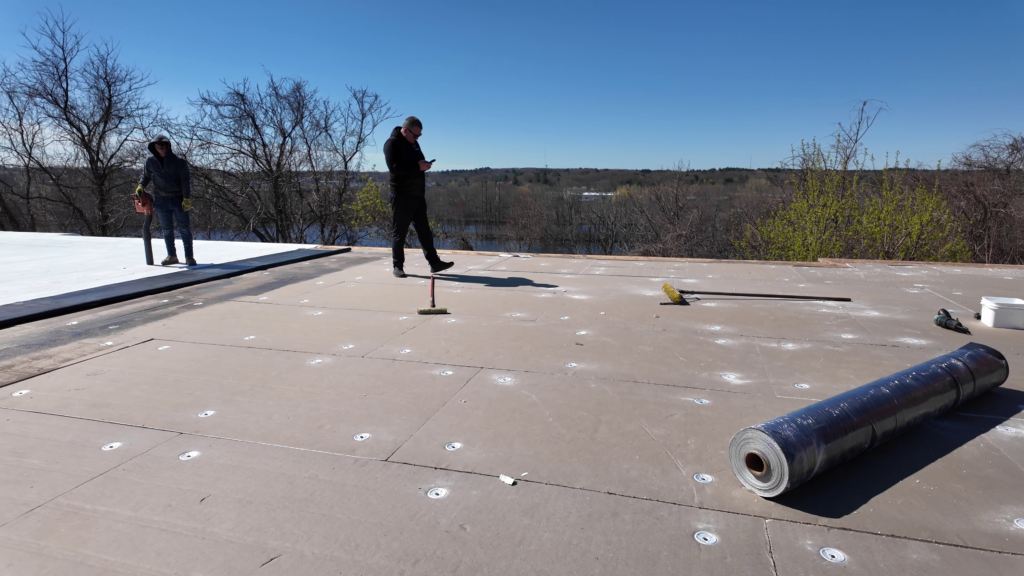
Versatility is one of the key advantages of PVC roofing. Whether a commercial building needs a durable roof capable of withstanding exposure to various chemicals or an industrial building wants a robust and reliable roofing solution, professional PVC roofers are equipped to provide customized PVC roofing solutions that meet the unique needs of every building.
In this context, it’s worth exploring how PVC roofing solutions can be customized for different types of buildings, such as commercial and industrial buildings, and how professional PVC roofers address the unique challenges these types of structures present.
Commercial Buildings
PVC roofing is a popular choice for commercial rooftops due to its durability, aesthetic appeal, and ability to withstand extreme conditions such as thermal cycles, wind loads, structural movement, and temperature extremes.
The heat-weldable property of PVC, which allows for the creation of watertight seams, is particularly advantageous for commercial buildings with rooftop equipment that emit grease or oil, such as those in the food service industry.
Industrial Buildings
Industrial buildings often face harsh rooftop conditions, including exposure to chemicals that could damage other roofing materials. In such cases, PVC roofing systems prove to be an advantageous option. Their ability to withstand various chemicals and other harsh conditions makes them well-suited for industrial buildings.
Common Challenges Resolved by PVC Roofers
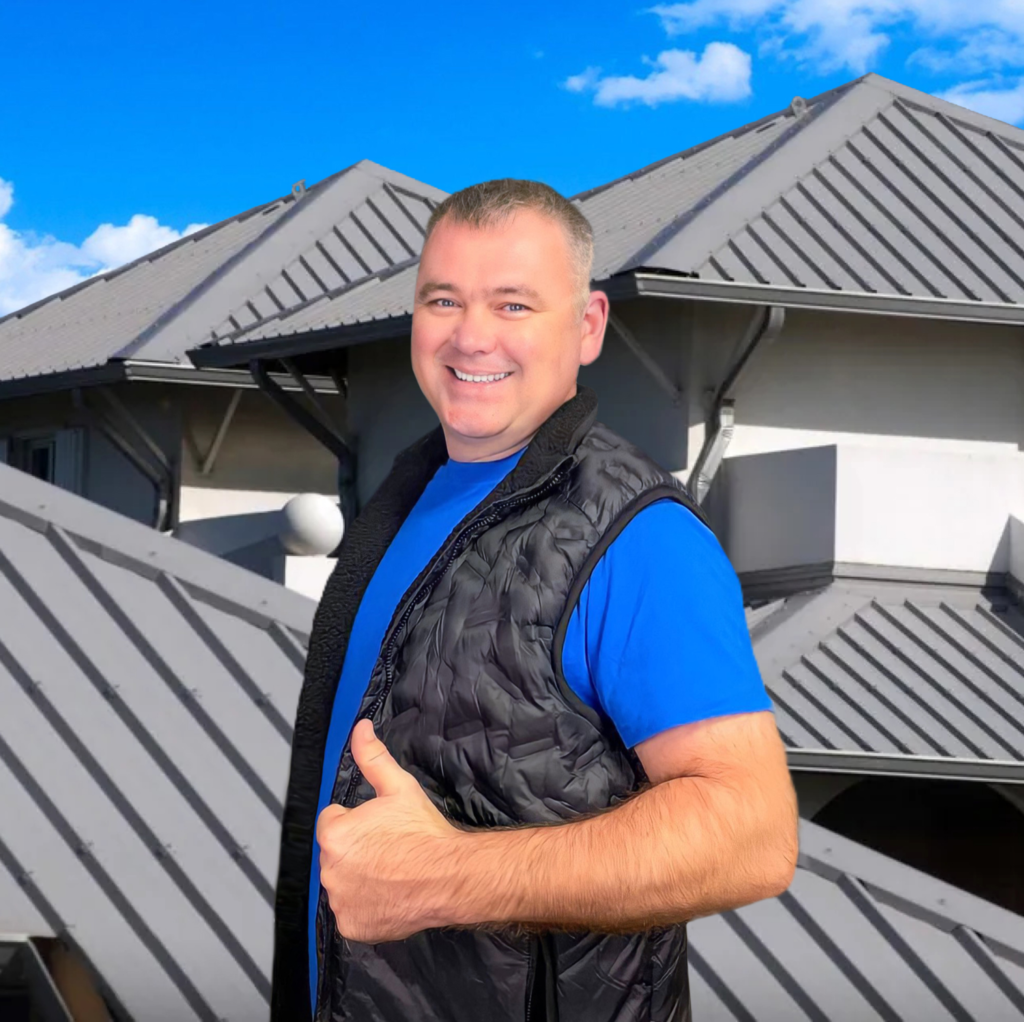
Despite its durability and robustness, PVC roofing has its challenges. Some common issues that may occur over the lifespan of a PVC roofing system include:
- Waterproofing issues
- Membrane cracks or blisters
- Water pooling
- Repairing punctures
Professional PVC roofers are equipped with the knowledge and skills to address these challenges and ensure the longevity of your PVC roofing system.
Let’s delve deeper into some challenges and how professional PVC roofers overcome them.
Overcoming Water Pooling
Flat roofs, also known as flat roof systems, commonly encounter the issue of water pooling, also known as ponding. Regular maintenance, including keeping drains clear of debris, is vital to preventing water ponding on flat roofs.
Repairing Punctures and Tears
Damages like punctures and tears can compromise a PVC roof’s waterproof integrity. However, even as they age, PVC membranes offer enhanced reparability through hot air welding.
To repair these damages, professional PVC roofers employ established methods such as patching up the punctures and tears, ensuring the integrity and longevity of the roofing system.
Navigating Installation in Cold Weather
While cold weather installation of PVC roofing can be challenging, professional PVC roofers are well-prepared to handle it. Despite colder conditions, PVC roofing remains flexible, facilitating installation and handling processes like seaming.
From allowing extra time for the sheets to relax to exposing the darker side of the PVC membrane to sunlight to assist in the relaxation of the material in colder climates, professional PVC roofers employ a variety of techniques to ensure the integrity and performance of PVC roofing welds in colder conditions.
Check Our Posts About PVC Roof
Massachusetts Commercial Roof Gutter Installation: Code Requirements and Best Practices
Cost vs. Value: Analyzing the Investment in a PVC Roof
Though generally pricier than other roofing options like EPDM and TPO roofing, PVC roofs are worth considering for their long-term benefits beyond the initial investment. From the roofing material’s durability and longevity to the roofer’s expertise and maintenance programs, employing a skilled professional PVC roofer can lead to long-term cost savings due to decreased repair, maintenance, and roof replacement needs.
Let’s break down these costs and consider the value of an investment in a PVC roof from two perspectives: the installation cost and the potential for long-term energy savings.
Breaking Down the Installation Cost
The cost of installing a PVC roofing system varies based on factors like material choice and roof size. Generally, the square footage price ranges between $4 and $12, including materials and installation. Complex design considerations, such as steep slopes, can also increase the installation costs for PVC roofing systems. Additionally, labor rates for installing PVC roofing are subject to regional variances, affecting the total installation cost.
Long-Term Energy Savings
In addition to the initial installation cost, PVC roofing provides potential long-term energy savings. The benefits of PVC roofing include:
- High solar reflectivity reduces heat absorption and lowers the dependence on air conditioning, resulting in energy savings for cooling the building.
- Reduced peak electricity demand, leading to overall energy efficiency in commercial buildings.
- Net energy savings across most climates.
These advantages make PVC roofing a cost-effective and energy-efficient choice for commercial buildings.
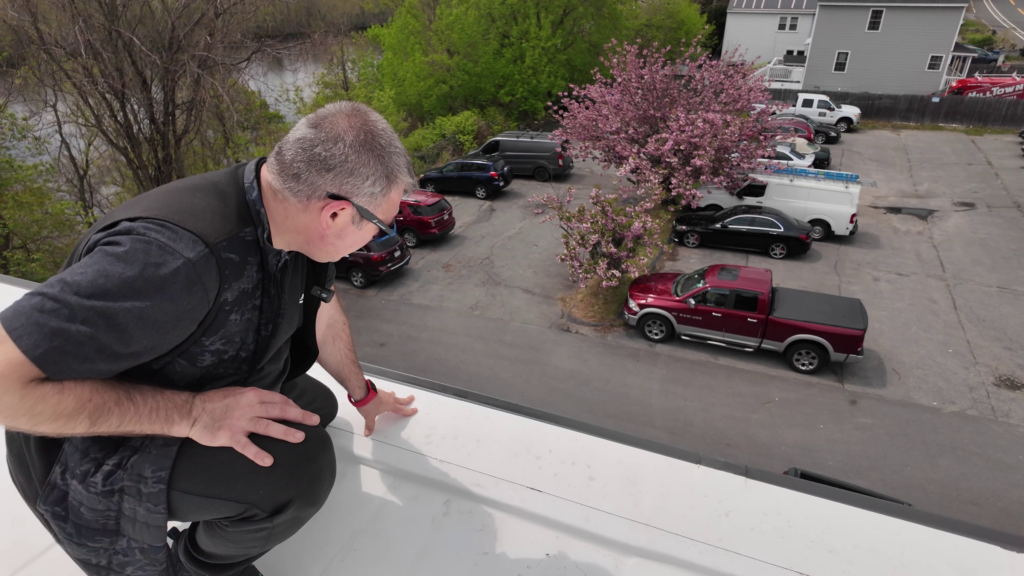
Summary
Navigating the world of roofing solutions can be complex, with many materials and techniques to choose from. However, as we’ve explored in this blog post, PVC roofing is a robust, versatile, and cost-effective solution. Its durability, environmental benefits, and suitability for various building types make it a compelling choice for roofing professionals and building owners.
However, the success of a PVC roofing project hinges not just on the material but also on the installer’s expertise. A professional PVC roofer brings a wealth of knowledge, skills, and industry-specific expertise to the table, ensuring the longevity and performance of your PVC roof. So, whether you’re embarking on a new construction project or considering a roof replacement, remember that choosing a professional PVC roofer is a decision that pays off in the long run.
Frequently Asked Questions
PVC roofing stands out from other materials due to its durability, longevity, resistance to chemicals and water, reflective properties, and recyclable nature, making it an environmentally friendly choice.
A professional PVC roofer is essential in ensuring the correct application of installation techniques, structural integrity, and mastery of heat welding techniques for reliable and durable seams during installation.
Hiring a professional PVC roofer offers high-quality installation, durable and attractive roofing, and comprehensive warranty and aftercare services for peace of mind.
Professional PVC roofers are equipped to handle challenges like waterproofing issues, membrane cracks, blisters, water pooling, and repairing punctures, ensuring the longevity and integrity of the roofing system.
The long-term benefits of a PVC roof, including durability, decreased maintenance needs, and potential for energy savings, make it a cost-effective solution.
Denis is the driving force behind ID Flat Roof, a leading company in Boston specializing in flat roof repair and installation for over 20 years.
Expertise:
Denis excels in PVC, TPO, EPDM, and rubber roofing. His meticulous approach ensures quality and customer satisfaction.
Innovation:
Denis incorporates cutting-edge solutions like skylights and solar PV roofing.




